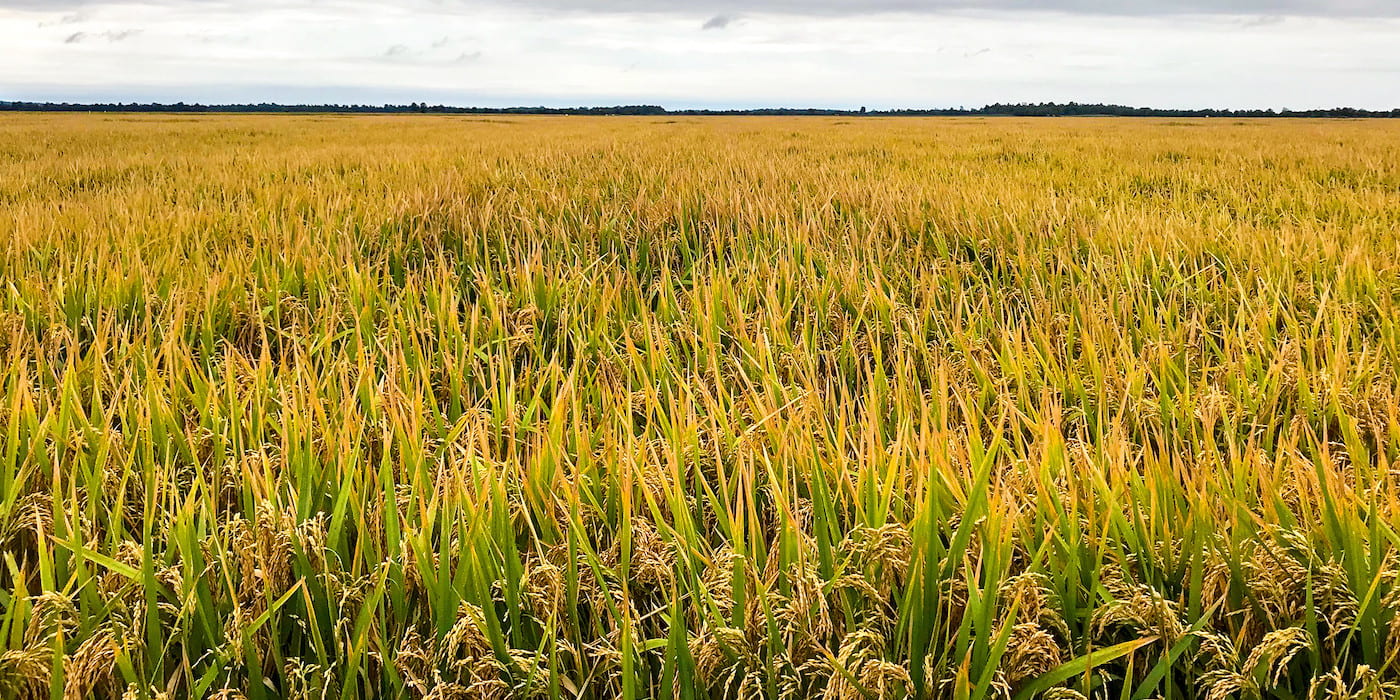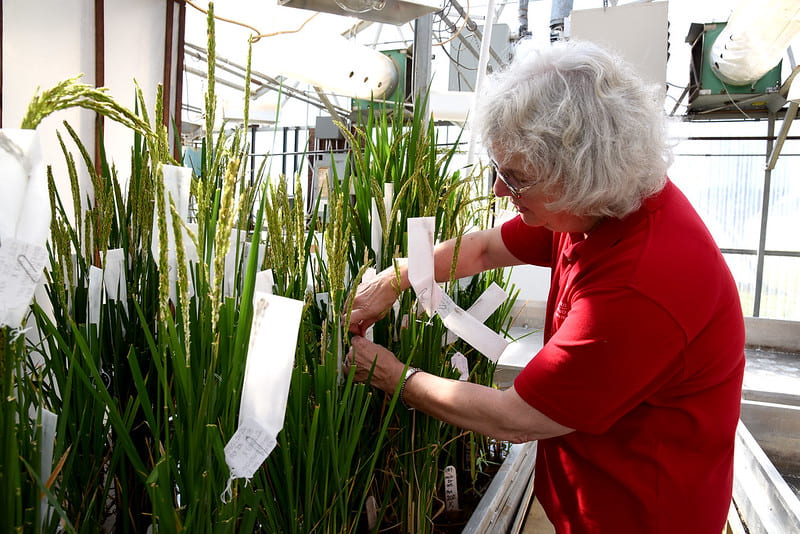Division of Agriculture Releases New Long-Grain Clearfield Rice Variety
CLL16 offers high yields, blast tolerance and high milling quality
By Fred Miller – Jan. 14, 2020

CLL16, a new high-yielding, long-grain Clearfield® rice variety from the Arkansas Agricultural Experiment Station rice breeding program, shown here in a Horizon Ag seed expansion field, will be available to farmers from Horizon Ag in 2021. (Photo courtesy of Horizon Ag)
Media Contact
Fred Miller
U of A System Division of Agriculture
Arkansas Agricultural Experiment Station
(479) 575-5647 | fmiller@uark.edu
FAYETTEVILLE, Ark. — CLL16, a new high-yield, long-grain Clearfield® rice variety developed by the University of Arkansas System Division of Agriculture will be available to rice growers from Horizon Ag in 2021.
Karen Moldenhauer, professor and rice breeder for the Division of Agriculture’s Arkansas Agricultural Experiment Station, said CLL16 has excellent rough rice yields, averaging 205 bushels per acre, slightly better than Diamond, which averages 204 bushels per acre.
Media Contact
Fred Miller
U of A System Division of Agriculture
Arkansas Agricultural Experiment Station
(479) 575-5647 | fmiller@uark.edu

Dr. Karen Moldenhauer shows cross-pollinated plants in the RREC breeding nursery. (U of A System Division of Agriculture photo by Fred Miller)
“Horizon Ag is excited to market CLL16, developed in partnership with the University of Arkansas System Division of Agriculture and BASF,” said Dr. Tim Walker, Horizon Ag general manager. “This variety promises a step change in yield potential, while offering industry leading blast tolerance and a milled product that continues to bring back the Gold Standard rice the Southern USA has historically produced.”
CLL16 is resistant to blast in Arkansas growing conditions, Moldenhauer said. It has demonstrated good milling yields, averaging 63 percent whole kernel and 69 percent total milled rice for samples from Arkansas Rice Performance Trials across the state.
“We recognize that the Clearfield® technology continues to offer significant benefits and ROI potential to rice farmers in the region, particularly when combined with top-performing varieties like CLL16. Horizon Ag is proud to continue to partner with the elite university breeding programs which benefit the industry immensely.”
CLL16 is a very stable cultivated variety with an early maturity date, averaging 86 days to 50 percent heading, similar to CL172 and Wells and about four days earlier than Roy J, Moldenhauer said. The plant is standard height with a 36-inch canopy, similar to Diamond.
“Grain weight and size are similar to Diamond with nice long, plump kernels,” Moldenhauer said. “It has typical southern U.S. long-grain cooking quality.”
“The plants have a very strong straw, indicating good lodging resistance,” Moldenhauer said. It is rated moderately susceptible to false smut and susceptible to sheath blight and bacterial panicle blight.
Nitrogen fertilizer requirements were 135 pounds per acre in performance trials, she said.
Clearfield® rice was developed at Louisiana State University from a breeding line of rice with a naturally occurring genetic mutation that was tolerant to the imidazoline family of herbicides, said Bob Scott, Rice Research and Extension Center director.
Scientists at LSU licensed the original Clearfield® lines to American Cyanamid, now BASF, which later shared the breeding material with the Division of Agriculture, Scott said. Horizon Ag is a seed technology company licensed by BASF to market Clearfield® rice varieties.
Breeder seed for CLL16 will be maintained at the Rice Research and Extension Center. It will be distributed to growers by Horizon Ag.
To learn more about the Division of Agriculture Rice Breeding and Research, visit the Arkansas Agricultural Experiment Station website. Follow us on Twitter at @ArkAgResearch and Instagram at ArkAgResearch.
About the Division of Agriculture
The University of Arkansas System Division of Agriculture’s mission is to strengthen agriculture, communities, and families by connecting trusted research to the adoption of best practices. Through the Agricultural Experiment Station and the Cooperative Extension Service, the Division of Agriculture conducts research and extension work within the nation’s historic land grant education system.
The Division of Agriculture is one of 20 entities within the University of Arkansas System. It has offices in all 75 counties in Arkansas and faculty on five system campuses.
The University of Arkansas System Division of Agriculture offers all its Extension and Research programs and services without regard to race, color, sex, gender identity, sexual orientation, national origin, religion, age, disability, marital or veteran status, genetic information, or any other legally protected status, and is an Affirmative Action/Equal Opportunity Employer.
